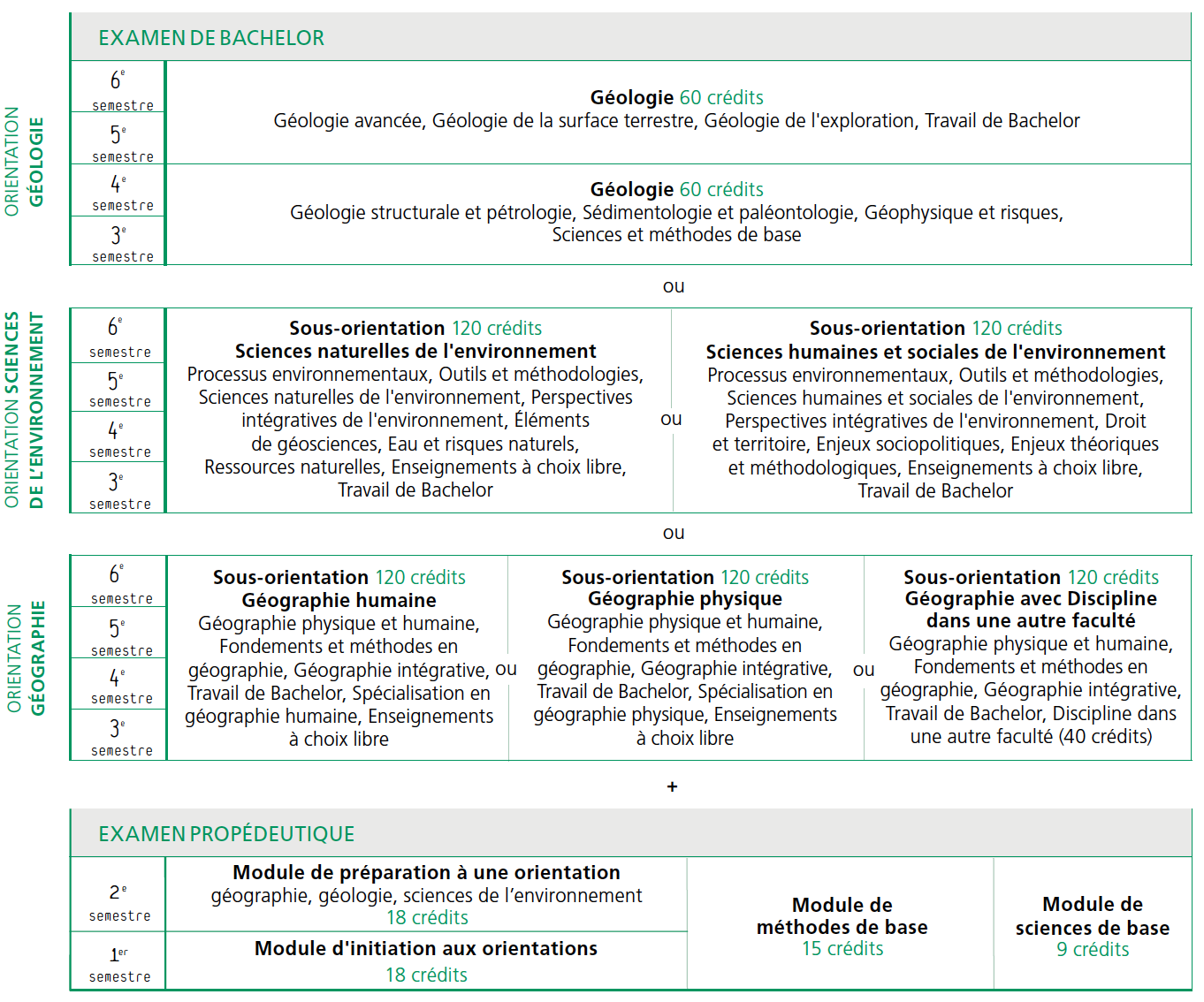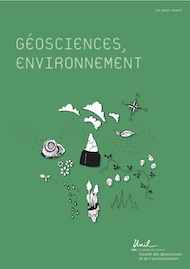The Bachelor's first year is common to all students. From the second year onwards, students choose one of the three study paths:
-
studies in environmental sciences offer a multi- and interdisciplinary course that provides an understanding of various environmental phenomena and the human and social issues associated with sustainability. They cover both knowledge of physical, geological, chemical and biological processes in the environment and the questions raised by the current ecological crisis.
-
studies in geography are based around and at the intersection of physical and human geography, with an emphasis on geomorphology, urban geography and social geography. Physical geography deals with methods that describe, analyse and model the earth’s surface and its environment. Courses in human geography aim to understand how societies are organised in their habitat and their environment, be it built or natural.
-
on the basis of courses in mathematics, physics and general chemistry, studies in geology focus on disciplines associated with earth sciences, such as mineralogy, crystallography, petrology, structural geology, sedimentology, palaeontology, geophysics and geochemistry. They examine the evolution of the earth’s system as a result of deep physical and chemical processes, but also how these processes have been expressed on the surface over the earth’s natural history.

Organiser
Faculty of Geosciences and Environment
Degree Awarded
Bachelor of Science (BSc) in Geosciences and Environment, orientation Geography, Geology or Environmental Studies
ECTS Credits
180
Duration
6 semesters
Teaching Language
French
Enrolment Deadline
30 April. If you require a visa to study in Switzerland: 28 February.
Further information
Applications
Course description
Timetables
At UNIL, the following Master's programmes are open without further conditions to holders of the Bachelor of Science (BSc) in Environmental Geosciences (depending on the chosen orientation):All orientations
Orientation Geography
- Master of Arts (MA) in Tourism Studies
- Master of Science (MSc) in Geography
- Master of Arts (MA) in Foundations and Practices of Sustainability
Orientation Environmental Studies
- Master of Science (MSc) in Environmental Sciences
- Master of Arts (MA) in Tourism Studies
- Master of Science (MSc) in Geography
- Master of Arts (MA) in Foundations and Practices of Sustainability
Orientation Geology
- Master of Science (MSc) in Earth Sciences
- Master of Science (MSc) in Biogeosciences
- Master of Science (MSc) In Environmental Sciences
- Master of Arts (MA) in Foundations and Practices of Sustainability
- Master of Arts (MA) in Tourism Studies
The MSc in Behaviour, Evolution and Conservation may be open, under certain conditions.
Courses in the Faculty of Geosciences and Environment offer numerous possibilities, with a range of options and specialisations to prepare and support your transition into the workplace. The opportunities for openness available in the curriculum and the generalist nature of courses in geography, sustainability and environmental sciences allow you to engage in a variety of activities, leading to numerous professional sectors based on excellent, versatile foundations; the Faculty also delivers training in specific areas requiring specialist knowledge (regional development, geographical information systems (GIS), hydrology, etc.). In terms of Earth Sciences, geologists generally take up more specialised positions in a specific area of geology. Biogeosciences graduates are generally associated with nature and soil management, or impact studies.
Areas of activity
Sustainability
- Consultancy firms or consultants specialising in sustainability strategies
- Administrative authorities with responsibility for environmental policies
- Environmental protection movements
- Research institutions
- Environmental management in corporate environments
- Journalism
- Creating your own business
Tourism studies
- Tourist offices
- Destination management organisations
- Tourism lobbying organisations
- National, regional or local public administrative authorities involved in tourism, transport, development, urban planning, culture and events
- R&D departments of large tourism groups
- Design and engineering offices
- Regional natural parks
- International organisations and NGOs
- Scientific and academic careers
- Emerging roles linked to sustainable tourism (Agenda 21 coordination and evaluation of tourism policies)
Geography
- Urban planning services
- Development offices
- Territorial development project coordination
- Sustainable urban development consultancy
- Active involvement in mountain environments
- Active involvement in development in countries in the global south
- Teaching
Environmental sciences
- Research institutions
- Design and engineering offices
- Administrative authorities with responsibility for environmental problems
- Non-governmental environmental protection organisations
- Environmental management in corporate environments
- Academic careers
Biogeosciences
- Federal and cantonal administration
- Non-governmental organisations
- Design and engineering offices
- Nature conservation and management
- Soil conservation and management
- Academic careers
Geology
- Natural hazards and risks
- Applied geology offices
- Environmental assessments
- Geoenergy research
- Mining industry
- Technical industry
- Cantonal/federal administration
- Academic careers in Switzerland and abroad
- Various NGOs
In figures
Every two years, the Swiss Federal Statistical Office (OFS) conducts a survey on graduate employment, one year after students have completed their course. View the results for Geosciences and Environment graduates online:
- “Premier emploi après les études” (“First job after graduating”) survey on employment among Swiss university graduates
- De l’UNIL à la vie active (From UNIL to working life) – results of the survey for UNIL graduates specifically
The Faculty of Geosciences and Environment has also carried out its own survey with Master of Geography graduates
- Enquête sur l'insertion professionnelle des diplômé·e·s du Master en géographie de l'UNIL (UNIL Master of Geography graduate employment survey)
Examples of positions
- Scientist with the Forestry and Wildlife Department, Natural Hazards section, State of Fribourg
- Energy adviser

